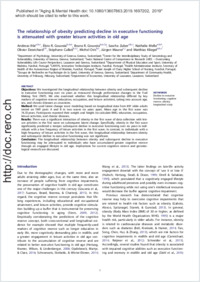The relationship of obesity predicting decline in executive functioning is attenuated with greater leisure activities in old age
- Ihle, Andreas Department of Psychology, University of Geneva, Geneva, Switzerland
- Gouveia, Élvio R. Center for the Interdisciplinary Study of Gerontology and Vulnerability, University of Geneva, Geneva, Switzerland
- Gouveia, Bruna R. Center for the Interdisciplinary Study of Gerontology and Vulnerability, University of Geneva, Geneva, Switzerland
- Zuber, Sascha Department of Psychology, University of Geneva, Geneva, Switzerland
- Mella, Nathalie Department of Psychology, University of Geneva, Geneva, Switzerland
- Desrichard, Olivier Swiss National Centre of Competence in Research LIVES – Overcoming Vulnerability: Life Course Perspectives, Lausanne and Geneva, Switzerland
- Cullati, Stéphane Center for the Interdisciplinary Study of Gerontology and Vulnerability, University of Geneva, Geneva, Switzerland
- Oris, Michel Center for the Interdisciplinary Study of Gerontology and Vulnerability, University of Geneva, Geneva, Switzerland
- Maurer, Jürgen Swiss National Centre of Competence in Research LIVES – Overcoming Vulnerability: Life Course Perspectives, Lausanne and Geneva, Switzerland
- Kliegel, Matthias Department of Psychology, University of Geneva, Geneva, Switzerland
-
09.12.2019
Published in:
- Aging & Mental Health. - 2019, p. 1–8
English
Objectives: We investigated the longitudinal relationship between obesity and subsequent decline in executive functioning over six years as measured through performance changes in the Trail Making Test (TMT). We also examined whether this longitudinal relationship differed by key markers of cognitive reserve (education, occupation, and leisure activities), taking into account age, sex, and chronic diseases as covariates.Method: We used latent change score modeling based on longitudinal data from 897 older adults tested on TMT parts A and B in two waves six years apart. Mean age in the first wave was 74.33 years. Participants reported their weight and height (to calculate BMI), education, occupation, leisure activities, and chronic diseases.Results: There was a significant interaction of obesity in the first wave of data collection with leisure activities in the first wave on subsequent latent change. Specifically, obesity in the first wave significantly predicted a steeper subsequent decline in executive functioning over six years in individuals with a low frequency of leisure activities in the first wave. In contrast, in individuals with a high frequency of leisure activities in the first wave, this longitudinal relationship between obesity and subsequent decline in executive functioning was not significant.Conclusion: The longitudinal relationship between obesity and subsequent decline in executive functioning may be attenuated in individuals who have accumulated greater cognitive reserve through an engaged lifestyle in old age. Implications for current cognitive reserve and gerontological research are discussed.
- Faculty
- Faculté des sciences et de médecine
- Department
- Master en médecine
- Language
-
- English
- Classification
- Medicine
- License
-
License undefined
- Identifiers
-
- RERO DOC 328007
- DOI 10.1080/13607863.2019.1697202
- Persistent URL
- https://folia.unifr.ch/unifr/documents/308361
Statistics
Document views: 130
File downloads:
- pdf: 230
